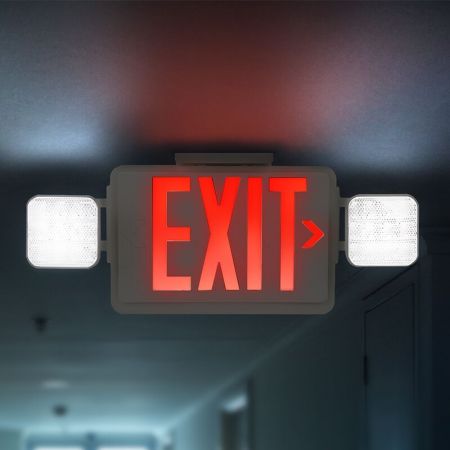Exit Signs. Exit Signs are not complicated devices. The main purpose of an exit sign is to display a safe exit route for building occupants. An exit sign is designed to be illuminated 24/7 while AC power is being supplied to the unit. At the same time, the AC power is used to charge the battery. In a power failure, an exit sign has a battery that is designed to keep the sign illuminated for a minimum of 90 minutes. Exit Signs can also have emergency light bulbs attached, these are called “combo” units.

Emergency Lights. Emergency Lights are also not complicated devices. The main purpose of an emergency light is to illuminate an area such as a hallway or classroom during a power failure. The stark difference is that emergency lights are off 24/7 when AC power is being supplied to the unit. Like an exit sign, the AC power that is supplied to the emergency light is also used to charge the battery. In a power failure, the emergency light will then turn on.

In the past, exit signs and emergency lights would be made of metal and would use incandescent bulbs. Nowadays, exit signs and emergency lights have plastic housing and LED bulbs. First, lets go over the pro’s over exit signs and emergency lights.
In a power failure, an exit sign and emergency light can help guide your way to the exit. Examples of exit signs and emergency lights used in emergency scenarios is a fire. When a building, such as a school catches fire, there will be smoke, right? In heavy and thick smoke, you won’t be able to see the exit or let alone the corridor. Exit signs and emergency lights are there to help you find your way. Without exit signs/emergency lights, you could be led in the wrong direction and your chances of getting out could be slim. That is why exit signs/emergency lights are required in commercial buildings.
Emergency Lights are used in power failures. Let’s say a school gets hit by a power failure, emergency lights are there to allow you to see whats in front of you. In this case, lets say the school cannot release the students early. Emergency Lights can still allow the teachers to give instructional learning to students without doing it in complete darkness. Exit Signs will also stay illuminated to guide the way to an exit.
Now, there are many complications in exit signs/emergency lights. Performance is KEY! Lets say you got a generic exit sign/emergency light off of Amazon. I don’t recommend this. Most generic exit signs/emergency lights are horrible. They barely work, and they can fail easily in emergencies. Generic emergency lights may also not light up an area sufficiently. The worst emergency lights are the ones that use incandescent lights. Most of the incandescent lights are dim, and most of the incandescent emergency lights don’t even have reflectors, making them extra-dim. There are also lead-acid battery emergency lights. The problem with these emergency lights is that they are heavily-dependent on the type of battery you put in. If you put in a bad quality battery, the unit might not work in an emergency, defeating the purpose of an emergency light. Lead-acid batteries may also make an emergency lighting unit unreliable. This could mean that the bulbs will be dimmer than intended, the emergency light may die under 90 minutes, or the unit might also just not work.
Finally, lets go onto exit sign color inconsistency. Exit Signs come in the colors red and green. Here is the problem, every state requires a different color. Indiana would require red, but Utah would require green. Red catches your attention, however red means STOP right there. Red means danger, red means not safe and don’t go through this way. Red is also used in many advertisements, so red in a mall wouldn’t be good at all. Green on the other hand means GO. Green means this way is safe, green means go through this way. Green is also a soothing color and catches your attention way better. You shouldn’t put green and red exit signs in the same area either, since maybe a child who is learning colors may be confused.
Well, thanks for reading my blog! This may have been my longest blog by far. I’ll see you next time.